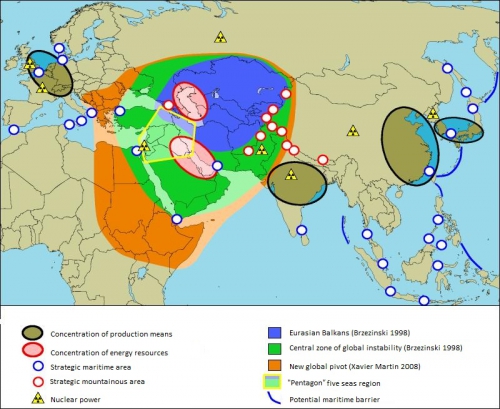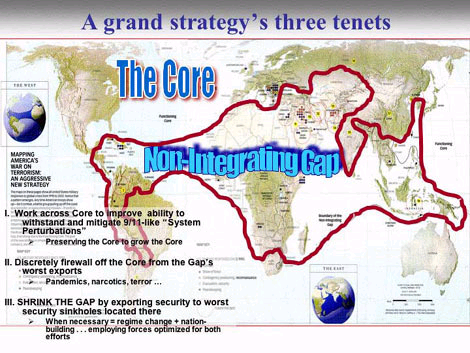samedi, 30 avril 2016
Postmodernist geopolitics vs Eurasia

Postmodernist geopolitics vs Eurasia
Thomas Barnett Global Involvement and Barack Obama’s Soft-Power Strategy
Like Tuathail and Agnew, T. Barnett rejects the concepts of classical geopolitics, such as the “Sea” and the “Land”. The American geopolitics has a separate “core” and “gap”. The typology, offered by Barnett is similar to the scheme offered by the sociologist I. Wallerstein. The “core” consists of approximately the same countries that are introduced in Wallerstein’s Center (“Old Core”) and semi-periphery (“New Core”), and the “gap” is Wallerstein’s periphery, respectively. The basis of such a division into the “core” and “gap” is the factor of “involvement” of the country into major global processes: economic, informational, demographic, political, etc. According to Barnett, to maintain the security in the “core” amidst threats from the “gap”, which is seeking chaos, as well as to provide the stable absorption of the former, you need to localize a subject in the “core” that is capable of acting as the Leviathan and System Administrator to the “gap”. Barnett regards the US as such a subject, in particular the US Armed Forces. Thus, the arrangement of the political space, according to him, shows how the US geostrategists regard the World after the Sea’s victory over the Land. The Land is no longer considered as a subject that is able to threaten the Sea’s existence, and is transformed into an object to be exposed by a Leviathan. According to Barnett, classical geopolitics lost its importance with the Sea’s victory over the Land at the end of the 20th century, and now the United States, as the leader of the winning Sea civilization, should take it as the approval of its civilizational code, consisting of the Western democracy model, free trade, financial sector’s priority, and information and societal “internationalization”. In practice, Barnett’s views match the US’ military position, revealing the real motives of US foreign policy, which is characterized as soft power.

Ulrich Beck’s Cosmopolitan Realism
The ideological and methodological basis for the implementation of global soft power can serve the theoretical concept of globalization by the German sociologist and political philosopher Ulrich Beck, whose concept of the “risk society” had an impact on the school of critical geopolitics.
According to Beck, in an era of globalization, the so-called “Cosmopolitan Realism” appears to replace “political realism”, guided only by a national point of view, which “underlines the crucial role of world economic forces and actors of cooperation and confrontation between the states.” There is a destruction of the legitimate world order now, where the dominant Nation-States provide the possibility to create a so-called cosmopolitan state.
“Cosmopolitanism” by Beck opposes the neoliberal unifying globalization and syncretic multiculturalism. Beck defines cosmopolitanism as the recognition of the ”otherness” of the others, removing the “friend-enemy” opposition paradigm. However, this globalist perspective detects anxious moments, showing the true background of the humanistic searchlights of soft globalization.
According to Beck, after the nation-state disappears, the importance of the roles of multinational economic actors and actors of global civil society increase. In the globalized world, the principles of international law are replaced by the un-strict rule of limited sovereignty. The classical boundaries between domestic and foreign policy are blurred and erased. Each State, in the case of ethnic cleansing or serious human rights violations against its citizens, must consider humanitarian intervention based on human and global citizen rights.
CFR Director Richard Haass’ Concept of Nonpolarity
The global world structure and the role that the supranational actors should play in it are regarded in the nonpolar world concept.
The author of this concept is Richard Haass, the current head of one of the most influential “think tanks” of American geostrategy - the Council on Foreign Relations (CFR).
According to Haass, the multipolar world existed already in recent history, in the era preceding the Second World War at the time of the confrontation between the three political theories: liberalism, communism, and fascism. Haass regard the “Cold War” period as the bipolar world’s existence. The period that began after the Soviet Union’s dissolution, according to the CFR head’s perspective, is not the era of unipolarity, but a moment of unipolarity that will last only 15 years. In Haass point of view, the unipolar world will not be replaced by a new multipolarity, but nonpolarity. The main difference between the two concepts is that powerful actors in the nonpolarity era are not states (as would be the case for multipolarity), but non-state actors: energy exporters, terrorist networks, paramilitaries, drug cartels, political parties, various NGOs, as well as 500 of the largest companies in the world.
Haass defines three factors affecting the end of unipolarity:
– new players appearing; this process is unstoppable;
– America creating a nonpolar world through its actions, weakening its own position, for example, the war in Iraq;
– Globalization increases the volume, speed, and importance of cross-border flows (a thesis, similar to the ideas of P. Virilio on “dromocracy”).
According to Haass, a new model of international relations should be based on multilateral cooperation, multilateralism, providing contacts not at the interstate level, but at the level of those actors that are useful for consolidation in order to solve tactical problems. Thus, organizations such as the UN are generally unsuitable for settling most issues. Haass, as well as Beck, actually “buries” the nation-state system. At the same time, the concept advocated by the CFR head does not abolish the idea of American Empire, but takes it to a new level. This empire is not conceptualized as a traditional state, but as a certain network structure. Haass talks not just about nonpolarity, but also about “coordinated nonpolarity”. There is a question: who will coordinate it?
In conclusion, we can identify some of the prerequisites for the formation of multipolar global geopolitics:
1. The social paradigm is fundamentally changing as well as the understanding of the paradigm – in geopolitics, the economy, and the globalization processes.
2. The Land pole’s lack of its own existence model in the changed coordinate system threatens its insertion into globalist projects, created by the thalassocratic civilization: whether it is a strict transformation into the Periphery, subordinate to the globalist core, or “soft” dissolution in mondialist “cosmopolitan space.” The neoconservative projects of US global domination or developed CFR soft-power technology for “nonpolar coordination” are just different methods to achieve the same goal.
3. Under modern conditions, we cannot appeal to the national state, to sovereignty, thus we turn to the old defunct models and naturally fail. On the other hand, we should pay attention to various fasciation theories developed by Western and non-Western geopolitical scientists.
4. It is necessary to take into account a trend mentioned by all modern geopolitical scientists, without any exception, connected with the supra-state and non-state actors existence in policy: from multinational corporations to rebel movements and “humanitarian funds”. By turning from the interstate to “multilateral” geopolitics, we should notice potential allies defend the Land’s interests among these new players.
5. It is necessary to carry out a fundamental revision of the entire classical geopolitical knowledge corpus. It is desirable to take into account deconstructive analysis of modern geopolitical scientists and post-modernists. For the formation of geopolitical subjects that can face modern challenges, it is necessary to overcome geographical determinism that is inherent in the naturalistic Cartesian discourse of the 20th century theories, which were taken for granted until recently.
6. One branch of multipolar world geopolitics should be political-geographical and political-economical approaches in connection to the study of the sociology and social psychology of the people of the Sea or Land civilizations, their social logos, and collective unconscious. The consideration of concepts of classical geopolitics in terms of ethnosociology and sociology of space will allow the avoidance of geopolitical determinism and to understand that the space is a challenge, which can be responded to in different ways by different ethnic groups.
The geopolitical study of society’s attitude towards the space will allow us to rethink and fundamentalize the basis of Eurasianism as the geopolitical doctrine that will allow us to reconsider the Eurasian phenomenon as a mechanical combination of two nihilistic concepts of the “East” and the “West”. The study of ethnosociology and ethnopsychology of the Eurasian societies allows the comprehension of Russia-Eurasia not as a “geographical axis of history”, but as an organic community, and offers the geopolitical concept of the multipolar world as an expression of ontological constants that define our existence.
00:05 Publié dans Eurasisme, Géopolitique | Lien permanent | Commentaires (0) | Tags : eurasisme, géopolitique |  |
|  del.icio.us |
del.icio.us |  |
|  Digg |
Digg | ![]() Facebook
Facebook



Les commentaires sont fermés.